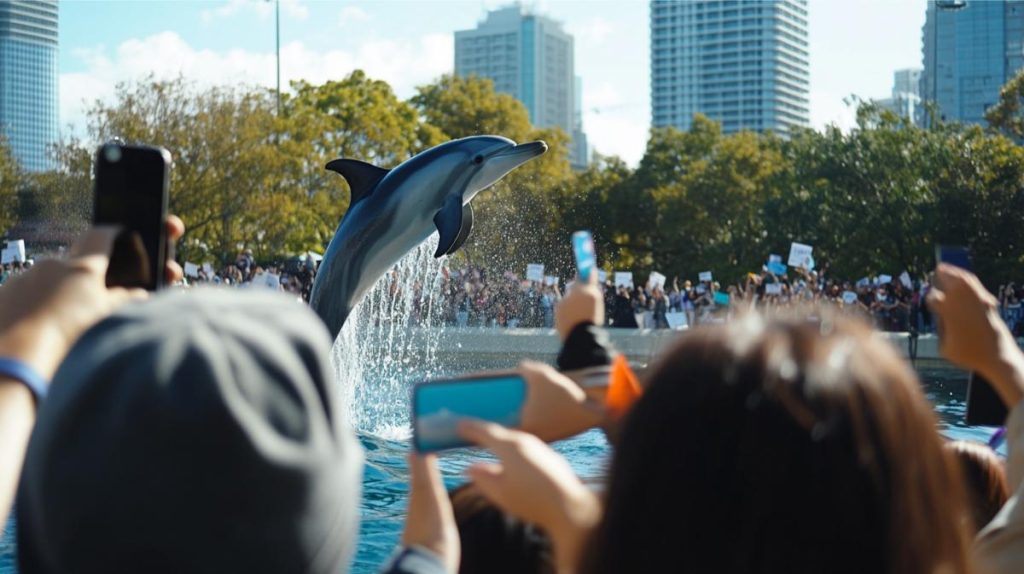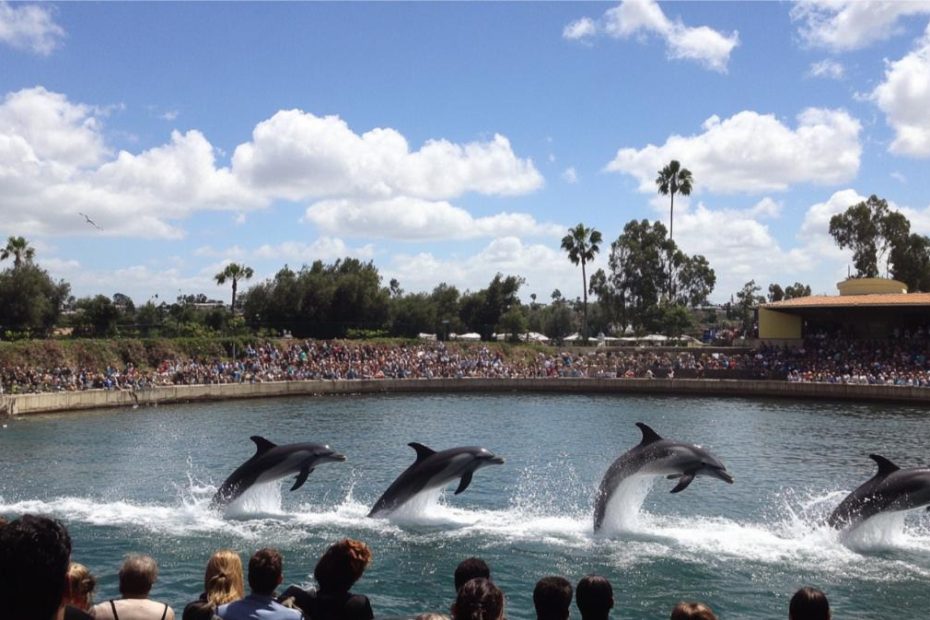Dolphins are amazing creatures that capture our hearts with their intelligence and playful nature. But have you ever wondered about the real lives of dolphins in captivity?
Animal welfare groups are fighting to end dolphin shows because they believe these performances harm the animals.
Dolphins in captivity often face stress, health problems, and shortened lifespans due to their unnatural living conditions.
You might be surprised to learn that the tricks you see in dolphin shows aren’t natural behaviors. These smart animals are trained to perform for food, which can be very different from their lives in the wild.
Many people enjoy watching dolphin shows, but animal advocates say the cost to the dolphins is too high. They argue that keeping dolphins in small tanks for entertainment is cruel.
Instead, they want to see dolphins living free in the ocean where they can swim long distances, use their echolocation, and live in family groups.
Key Takeaways
- Dolphins in captivity often face health issues and shorter lives than their wild counterparts
- Dolphin shows force unnatural behaviors and can be stressful for the animals
- Animal welfare groups advocate for ending dolphin captivity to protect these intelligent creatures
The Reality of Life in Captivity

Dolphins kept in captivity face many challenges. Their lives are very different from those of wild dolphins.
Let’s look at how this affects them and what people are doing about it.
Health and Behavior
Captive dolphins often struggle with health issues. You might notice them acting strangely in shows. This isn’t normal dolphin behavior.
In fact, captive marine mammals suffer from extreme stress and neurotic behaviors. Imagine being stuck in a small pool when you’re used to roaming the vast ocean!
These smart animals get bored easily. They might:
- Swim in circles
- Float listlessly
- Show aggression towards each other or trainers
Did you know that bottlenose dolphins are six times more likely to die right after being captured? That’s a scary statistic!
The Advocacy for Sanctuary
Animal lovers are pushing for a better life for captive dolphins. They want to see these playful creatures in seaside sanctuaries. These are like retirement homes for dolphins!
In these sanctuaries, dolphins can:
- Swim in larger, more natural spaces
- Experience ocean currents and waves
- Interact with fish and other sea life
Remember Sampal? She’s a dolphin who was freed after four years in captivity. Her story shows that with a little help, captive dolphins can return to the wild.
Legislation and Public Pressure
You might be surprised to learn that many places are banning dolphin shows. People like you are speaking up, and lawmakers are listening!
Some recent changes:
- Canada banned keeping whales and dolphins in captivity
- California stopped captive breeding of orcas
Public pressure is making a difference. When you choose not to buy tickets to dolphin shows, you’re sending a message.
Companies like SeaWorld are feeling the heat and changing their practices.
Countering the Show Business

You can make a big difference in ending dolphin shows. There are better ways to learn about and appreciate these amazing animals.
Let’s look at some key strategies and alternatives.
The Role of Education and Alternatives
Did you know you can have an educational experience without supporting dolphin shows? It’s true!
Instead of watching orcas do tricks, why not go whale watching? You’ll see these intelligent animals in their natural habitat. Cool, right?
As mentioned earlier, many animal advocacy groups are pushing for sea sanctuaries. These give cetaceans more freedom while still allowing you to observe them.
You can also check out virtual reality experiences. They let you “swim” with dolphins without any animal cruelty. How’s that for a win-win?
The Economic Aspect
You have more power than you think! By choosing where to spend your money, you’re sending a message. Many travel companies are listening.
TripAdvisor and Expedia Group have stopped selling tickets to dolphin shows. Booking.com is following suit. Your choices are making waves!
But what about the jobs, you ask? Good news! Transforming dolphinariums into rehabilitation centers creates new opportunities.
It’s not just good for the animals – it’s good for the economy too.
Remember, your wallet is your voice. Use it to support animal-friendly entertainment venues.
Together, we can create a world where dolphins are free to be dolphins!
